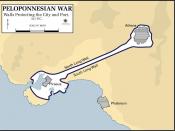The death of Pericles was a significant event in the course of the Peloponnesian War; however, even without Pericles' leadership the Athenian Assembly had countless opportunities to prevent their loss and chose not to take them. The fickleness and inefficiency of democracy ('the mob') allowed the Athenians to be easily influenced and therefore electing populists such as Cleon, Lysicles and Hyperbolus into dominant leadership roles. Election, via democratic means, of such populists, meant that the Athenians would take a much more aggressive approach to the war and therefore abandon the policies that Pericles had previously established. So in turn, democracy the institution for which the Athenians fought tirelessly to protect, rather than the death of Pericles, ironically became the dominant factor influencing the final outcome of this Ancient Greek civil war.
As can be expected from pioneer governmental institutions, Athenian democracy was not perfect. In fact it was far from it.
It resulted in the establishment of poor policies by aggressive populists who sought "...private ambition and private profit...which were bad both for the Athenians themselves and their allies." (Thucydides). These self interested populist leaders with personal gain in mind established extensive internal political instability "...by quarrelling among themselves [and] began to bring confusion into the policy of the state." (Thucydides). Repeated opportunities to accept terms of peace after the battles of Pylos (425), Arginusae (406) and Aegospotami (405) were ignored by the inefficient Athenian demos eventually resulting in the devastation of the once dominant city-state. Internal political strife can also be attributed to the presence of Nicias, a conservative aristocrat, who intensely opposed the aggressive policies of the populist leaders. This divergence of opinion meant that the Athenians would struggle greatly to establish continuously successful policies and strategies, and were immediately impeded by this inefficient nature...


